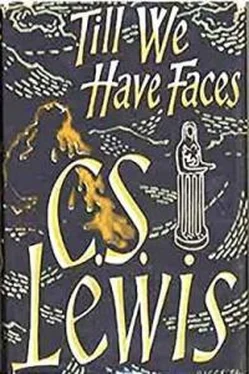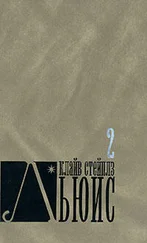We were going up and down little hills, but always more up than down, on a good enough road, with grass–lands on each side of us. There were dark woods on our left, and presently the road bent towards them. But here Bardia left the road and took to the grass.
“That’s the Holy Road,” he said, pointing to the woods. “That’s the way they took the Blessed (peace be on her). Our way will be steeper and shorter.”
We now went for a long time over grass, gently but steadily upward, making for a ridge so high and so near that the true Mountain was quite out of sight. When we topped it, and stood for a while to let the horse breathe, everything was changed. And my struggle began.
We had come into the sunlight now, too bright to look into, and warm (I threw back my cloak). Heavy dew made the grass jewel–bright. The Mountain, far greater yet also far further off than I expected, seen with the sun hanging a hand–breath above its topmost crags, did not look like a solid thing. Between us and it was a vast tumble of valley and hill, woods and cliffs, more little lakes than I could count. To left and right, and behind us, the whole coloured world with all its hills was heaped up and up to the sky, with, far away, a gleam of what we call the sea (though it is not to be compared with the Great Sea of the Greeks). There was a lark singing; but for that, huge and ancient stillness.
And my struggle was this. You may well believe that I had set out sad enough; I came on a sad errand. Now, flung at me like frolic or insolence, there came as if it were a voice—no words, but if you made it into words it would be, “Why should your heart not dance?” It’s the measure of my folly that my heart almost answered, Why not? I had to tell myself over like a lesson the infinite reasons it had not to dance. My heart to dance? Mine whose love was taken from me, I, the ugly princess who must never look for other love, the drudge of the King, the jailer of hateful Redival, perhaps to be murdered or turned out as a beggar when my father died (for who knew what Glome would do then?). And yet, it was a lesson I could hardly keep in my mind. The sight of the huge world put mad ideas into me; as if I could wander away, wander for ever, see strange and beautiful things, one after the other to the world’s end.
The freshness and wetness all about me (I had seen nothing but drought and withered things for many months before my sickness) made me feel that I had misjudged the world; it seemed kind, and laughing, as if its heart also danced. Even my ugliness I could not quite believe in. Who can feel ugly when the heart meets delight? It is as if, somewhere inside, within the hideous face and bony limbs, one is soft, fresh, lissom and desirable.
We had stood on the ridge only for a short time. But for hours later, while we went up and down, winding among great hills, often dismounting and leading the horse, sometimes on dangerous edges, the struggle went on.
Was I not right to struggle against this fool–happy mood? Mere seemliness, if nothing else, called for it. I would not go laughing to Psyche’s burial. If I did, how should I ever again believe that I had loved her? Reason called for it. I knew the world too well to believe this sudden smiling. What woman can have patience with the man who can be yet again deceived by his doxy’s fawning after he has thrice proved her false? I should be just like such a man if a mere burst of fair weather, and fresh grass after a long drought, and health after sickness, could make me friends again with this god–haunted, plague–breeding, decaying, tyrannous world. I had seen. I was not a fool. I did not know then, however, as I do now, the strongest reason for distrust. The gods never send us this invitation to delight so readily or so strongly as when they are preparing some new agony. We are their bubbles; they blow us big before they prick us.
But I held my own without that knowledge. I ruled myself. Did they think I was nothing but a pipe to be played on as their moment’s fancy chose?
The struggle ended when we topped the last rise before the real Mountain. We were so high now that, though the sun was very strong, the wind blew bitterly cold. At our feet, between us and the Mountain, lay a cursed black valley: dark moss, dark peat–bogs, shingle, great boulders, and screes of stone sprawling down into it from the Mountain—as if the Mountain had sores and these were the stony issue from them. The great mass of it rose up (we tilted our heads back to look at it) into huge knobbles of stone against the sky, like an old giant’s back teeth. The face it showed us was really no steeper than a roof, except for certain frightful cliffs on our left, but it looked as if it went up like a wall. It too was now black. Here the gods ceased trying to make me glad. There was nothing here that even the merriest heart could dance for.
Bardia pointed, ahead to our right. There the Mountain fell away in a smooth sweep to a saddle somewhat lower than the ground we stood on, but still with nothing behind it but the sky. Against the sky, on the saddle, stood a single leafless tree.
We went down into the black valley on our own feet, leading the horse, for the going was bad and stones slipped away from under us until, at the lowest place, we joined the sacred road (it came into the valley through the northern end, away to our left). We were so near now that we did not mount again. A few loops of the road led us up to the saddle and, once more, into the biting wind.
I was afraid, now that we were almost at the Tree. I can hardly say of what, but I know that to find the bones, or even the body, would have set my fear at rest. I believe I had a senseless child’s fear that she might be neither living nor dead.
And now we were there. The iron girdle, and the chain that went from it about the gaunt trunk (there was no bark on the Tree) hung there and made a dull noise from time to time as they moved with the wind. There were no bones, nor rags of clothing, nor marks of blood, nor anything else.
“How do you read these signs, Bardia?” said I.
“The god’s taken her,” said he, rather pale and speaking low (he was a god–fearing man). “No natural beast would have licked his plate so clean. There’d be bones. A beast—any but the holy Shadowbrute itself—couldn’t have got the whole body out of the irons. And it would have left the jewels. A man, now—but a man couldn’t have freed her, unless he had tools with him.”
I had not thought of our journey’s being so vain; nothing to do, nothing to gather. The emptiness of my life was to begin at once.
“We can search about a bit,” I said; foolishly, for I had no hope of finding anything.
“Yes, yes, Lady. We can search about,” said Bardia. I knew it was only his kindness that spoke.
And so we did; working round in circles, he one way and I the other, with our eyes on the ground; very cold, one’s cloak flapping till leg and cheek smarted with the blows of it.
Bardia was ahead of me now, eastward and further across the saddle, when he called out. I had to thrust back the hair that was whipping about my face before I could see him. I rushed to him; half–flying, for the westwind made a sail of my cloak. He showed me what he had found—a ruby.
“I never saw her wear such a stone,” said I.
“She did though, Lady. On her last journey. They had put their own holy gear on her. The straps of the sandals were red with rubies.”
“Oh, Bardia! Then somebody—something—carried her thus far.”
“Or maybe carried only the sandals. A jackdaw’d do it.”
“We must go on; further on this line.”
“Carefully, Lady. If we must, I’ll do it. You’d best stay behind.”
“Why, what’s to fear? And anyway, I’ll not stay behind.”
Читать дальше











